The ‘Being Black in the EU’ survey shows that the cases of racial discrimination increased from 39% to 45% in 5 years. Only 9% are reported.
![Photo: [link] Desola Lanre-Ologun [/link], Unsplash CC0.](https://cms.evangelicalfocus.com/upload/imagenes/654226f651159_desolalanreologun940.jpg) Photo: [link] Desola Lanre-Ologun [/link], Unsplash CC0.
Photo: [link] Desola Lanre-Ologun [/link], Unsplash CC0.
A recent report of the European Union Agency for Fundamental Rights (FRA), titled ‘Being Black in the EU’, presents the latest comparative evidence about experiences of people of African descent in 13 EU member states.
It shows that racial discrimination, harassment and violence continues to haunt their daily lives, despite the EU binding anti-discrimination law and significant other policies.
“It is shameful to say that racism remains pervasive and relentless. Almost half of people of African descent in the EU face racism and discrimination in their daily lives”, said the FRA director, Michael O’Flaherty.
Today, those incidents remain invisible and “often go unreported, denying victims the support they are legally entitled to receive from the institutions meant to protect them”, added O’Flaherty.
However, there has also been “a major milestone”, when the EU adopted its first ever Anti-Racism Action Plan (2020-2025), which “serves to tackle individual attitudes and behaviours”, and appointed a commissioner for equality and a coordinator on combating racism.
The report analyses the responses of 6,752 immigrants resident in Austria, Belgium, Denmark, Finland, France, Germany, Ireland, Italy, Luxembourg, Poland, Portugal, Spain and Sweden, who were born in a sub-Saharan African country, or are descendants of immigrants, with at least one parent born in sub-Saharan Africa.
According to the report, the number of people of African descent surveyed that experience racial discrimination, increased from 39% in 2016 to 45% in 2022.
The survey asked about grounds of discrimination including characteristics protected in EU law, such as skin colour, age, sex, sexual orientation, gender identity, disability, ethnic origin and religions beliefs. Skin colour and ethnic or immigrant background were the two grounds most cited.
Furthermore, the prevalence of discrimination on any ground is high among young people, people with a higher level of education, people with disabilities and people who wear traditional or religious clothing in public.
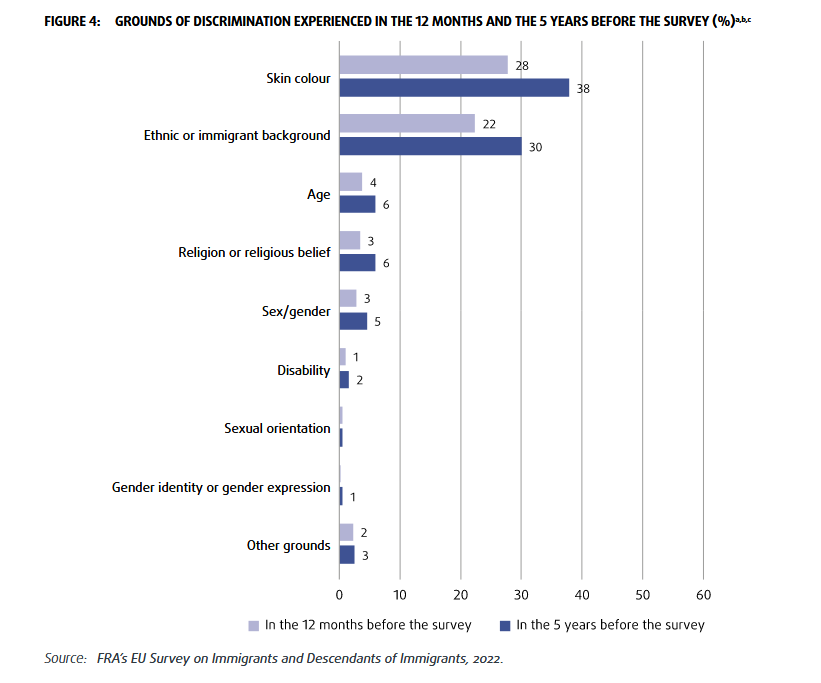
In order to improve this, the FRA recommends that “EU member states should improve the effectiveness of regulatory measures and institutional arrangements established to enforce anti-discrimination legislation”.
Another concern is that only 9% of victims report incidents, and “very few (4%) report incidents to an equality body”.
Overall, women of African descent tend to report incidents of discrimination more often than men (12% compared with 6%). Slightly higher rates of reporting are seen for older people than for younger people. Respondents who identify as Christian are almost twice as likely as Muslims to file a complaint (11% compared to6 %)
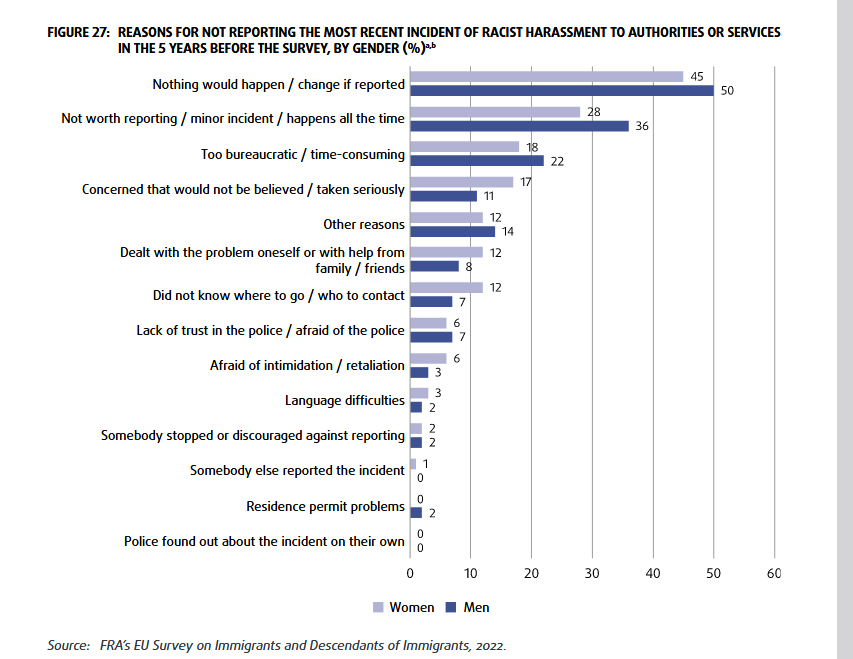
The FRA encourages the European Commission and EU member states are to “develop and implement a monitoring and accountability mechanism, to ensure the effective application of EU anti-discrimination legislation”.
The report also shows that 30% of respondents say that they experienced one or more incidents of racist harassment in the 5 years before the survey; 24% that they did so in the 12 months preceding the survey.
The most common ways of racist harassment involve offensive non-verbal cues (19%) or offensive or threatening comments (15%), followed by threats of violence (4%).
Regarding racist violence, 4% of respondents say that they experienced a racist attack in the 5 years before the survey, and 2% say that they did so in the 12 months before the survey.
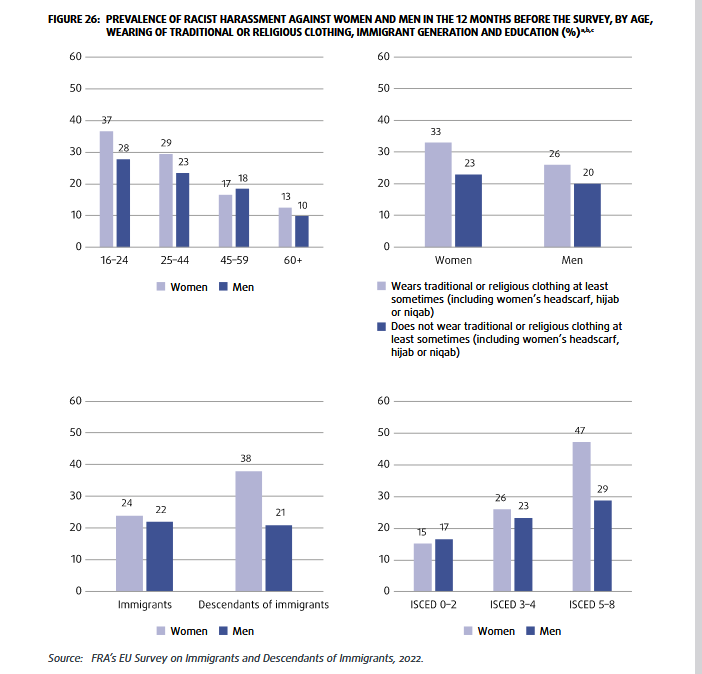
“Member states should ensure that victims of racist crime can seek redress and that the police, public prosecutors and judges, are trained to recognise and respond appropriately to the impact of racist abuse on victims”, points out the report.
“Over half of people of African descent feel that their most recent police stop was a result of racial profiling”, says the report.
One quarter (26%) of respondents were stopped by the police in the 5 years before the survey. Among those, 48% defined the most recent stop as racial profiling. 12% were stopped by the police in the 12 months before the survey, and 58% of those considered the most recent stop to be a result of racial profiling.
The FRA calls on member states “to adopt measures necessary to prevent and eradicate discriminatory institutional practices and culture that enables discriminatory attitudes among police officers and unlawful profiling”.
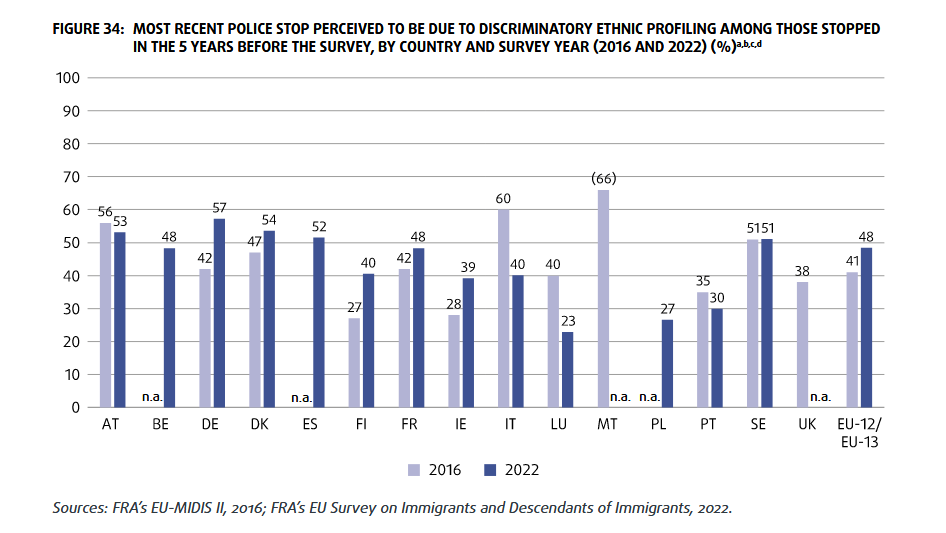
The report reveals that “many people of African descent work in elementary occupations and are over-qualified for their jobs. Every third has a temporary contract and lacks job security”.
On average, the employment rate among people of African descent aged 20 to 64 years (71%) is similar to that of the general population (73%) of the same age range. However, 32% of respondents who are in employment work in elementary occupations, compared with an average of 8% for the general population across all 27 EU member states.
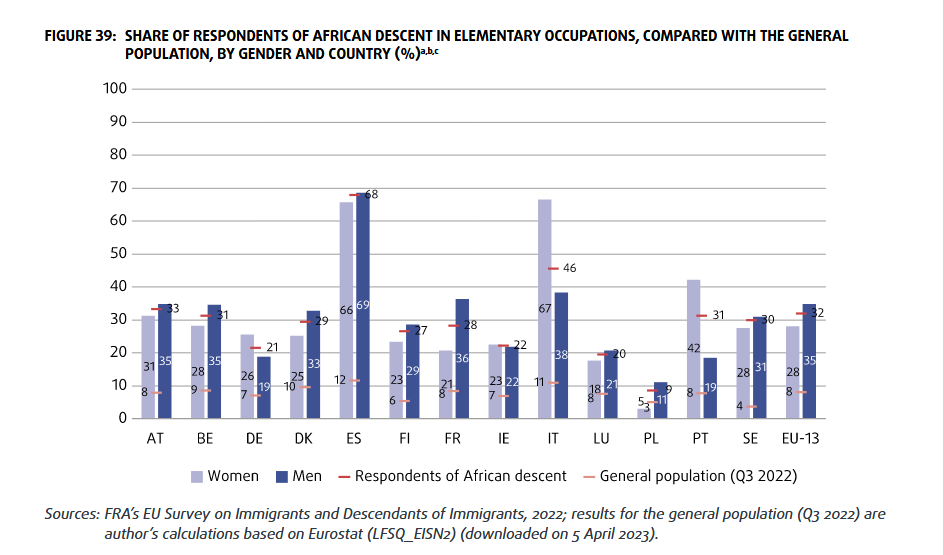
The FRA warns that “rising inflation and cost of living have put people of African descent at higher risk of poverty than the general population. A third face difficulties in making ends meet”.
That is why it recommends “to take all measures necessary to address discrimination against people of African descent in the housing market, including addressing inequalities in accessing housing and ensuring adequate housing and housing assistance”.
Furthermore, the survey results show that “9% of respondents felt racially discriminated against when using healthcare services”.
In order to solve this, the FRA proposes to “develop new monitoring tools, for example making use of human rights indicators to map health inequalities or highlight patients’ rights and perspectives within the scope of EU law”.
You can read the full report here.
[donate]

Las opiniones vertidas por nuestros colaboradores se realizan a nivel personal, pudiendo coincidir o no con la postura de la dirección de Protestante Digital.
Si quieres comentar o